| |
This Veterans’ Day 2015 brings to mind the veterans in my family who go all the way back to the Civil War.
Civil War – William Alvin Butt
My great grandfather, William Alvin Butt, joined the 126th Illinois Infantry, Company C, in 1862 when he was 19 years old and served during the Civil War as a musician until he was mustered out as corporal in 1865. During the American Civil War, military leaders with the Union and Confederate Armies relied on military musicians to entertain troops, position troops in battle, and stir them on to victory — some actually performing concerts in forward positions during the fighting.
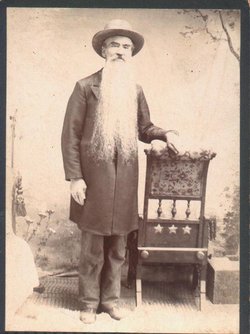
William Alvin Butt. Alvin Sr. was a farmer, and after the Civil War worked on the railroad. He lived at Fairbury, Forest, Niantic, Bement, and Decatur, IL. About 1885, he moved his family to Green Forest, AR, where he stayed the rest of his life. After Anna Weaver Butt's death, he married Mattie T. Lytle, a widow. They had no children. Alvin, Sr., had a knee length beard of which he was quite proud. His sons could only trim it when he was asleep. Picture of Alvin, Sr. shows him in a black frock-style coat, believed to be made during the 1880's. He was a justice of the peace, road commissioner, carpenter, and farmer in Carroll County, AR. (Photo) As reported in the Bethany ECHO 1902: Wm. Butt of Arkansas is here visiting with relatives. He attracts much attention as he walks the streets, for he has a beard that's 30 inches long. (provided by Dorothy D. Butt, Bethany, IL)
There were two types of historical traditions in military bands. The first was military field music. This type of music included bugles, bagpipes, or fifes and almost always drums. This type of music was used to control troops on the battlefield as well as for entertainment. One example of controlling the troops was the drum beats setting the march cadence for the troops. Following the development of instruments such as the keyed trumpet or the saxhorn family of brass instruments, a second tradition of the all brass military band was formed.
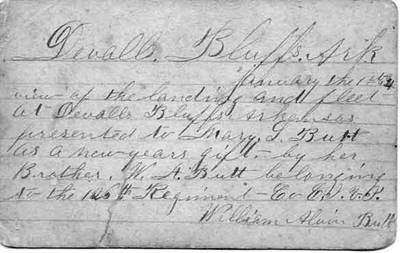 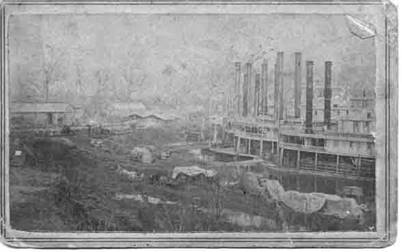
The postcard above was sent by William Alvin Butt from DeValls Bluff Arkansas in January 1864 where he was part of the Union occupation. DeValls Bluff was strategically important to both the Union and Confederate armies as a major White River port and as head of the Memphis and Little Rock Railroad. It became a key Union supply depot after its fall 1863 occupation, as well as a haven for refugees, both freedmen and white. Mounted Confederates operated around the town during 1864, attacking the railroad and Union troops on the nearby prairie.
From the Green Forest Tribune, February 22, 1907:
W.A. Butt - In putting before the public an edition of the Tribune devoted to a writeup of Green Forest and the resources of Carroll County, together with its business and professional men, the name of Mr. W.A. Butt, the worthy and efficient mayor of our city, should occupy a prominent place.
There are generally men in every community who, by reason of their individuality, make their mark upon the public. Such a one is Mr, W.A. Butt, progressive, prominent and always influential in everything for the welfare of our city and county.
As mayor of Green Forest he has exercised sound judgement and marked ability and no better man could be found to fill this important office.
In relation to his business he is known as one of the most successful undertakers in this part of the state. He is a skilled embalmer and a competent funeral director and keeps constantly on hand a full line of coffins, caskets and burial robes and all kinds of funeral supplies.
From the Green Forest Tribune Booster edition 1978 - provided by Dorothy D. Butt, Bethany, IL)
The very busiest man who ever lived in the town. Hot or cold, wet or dry, in season and out of season, he has ad something to engage his attention. He has been in "office" without cessation for all these years, often loaded to the guards with "honors" of this character. He has been 'Squire for eighteen years, in recognition of the efficiency of which service the Tribune suspended the rules and dubbed him "Judge" at the end of his fifth term on the "bench" and we wish to say that no chancellor ever wore the title more becomingly.
He has been mayor of the town over and over, school director, time after time, city treasurer, secretary of the Masonic Lodge, master of the lodge, tyler, steward of the church and the Lord only knows what manner of public burden has not fallen on his broad shoulders since he cast his lot in this town.
But under all of the loads with an unbroken record for faithfulness to his trusts, Judge Butt has managed to keep the wolf a comfortable distance and has retired with a competency sufficient to keep him through his remaining years.
Nor has Judge Butt's liberality in public affairs been limited to the time he has devoted to public service. He has been exceedingly liberal with his means, often going to the long black book he carries inside of his coat pocket to answer a call for support of charity, the church or to help out with some public improvement fund.
Taking that broad view of life, that his wealth is measured by good deeds, and that the things one has done to promote the comfort and happiness of others, our good friend Judge Butt is a millionaire in the best sense of the term.
James Edward (Jimmie) Ryland
Shirley’s father, James Edward (“Jimmie”) Ryland and her mother, Mary Chew (“Chew”) Brummett grew up in Pine Bluff, Arkansas. They graduated from high school in 1936 and were married on June 16, 1941. They moved to Memphis, where Jimmie had been working as a salesman for a paper products company since 1936. In 1942, he enlisted in the Army Air Corps as an Aviation Cadet Candidate. This was the first time that non-college graduates were offered the opportunity to become pilots.
Shirley’s older sister, Katherine Amy (“Katie”) was born November 6, 1942. Jimmie was called to active duty in 1943 and spent over a year in an accelerated college program, from which he graduated in March 1944 and was commissioned a second lieutenant. Chew, meanwhile, moved back with her parents in Pine Bluff.
After completing 48 weeks of flight training in Chattanooga, TN, Maxwell Field, AL, Lafayette, LA, Walnut Ridge, AR and Stuttgart, AR, Jimmie qualified as pilot of a B-24 Liberator and was ordered to the European Theater on September 19, 1944.
Flying with a stopover in the Azores, he reported first to North Africa. He was scheduled to fly next to Italy, but during takeoff, one of his engines malfunctioned, and he turned back. All of the other planes in his group were lost in a storm over the Mediterranean.
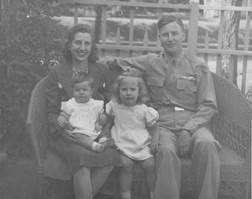
Jimmie Ryland with daughters Shirley and Katie in 1945
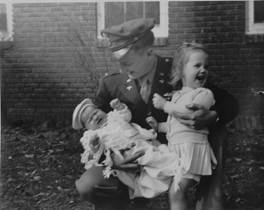
From left to right, Chew, Shirley, Katy and Jimmie after Jimmie’s return from Europe in 1945
Jimmie flew five combat bombing missions over German-held territory from Italy. On his fifth mission, his plane took flak while bombing Vienna on October 17, 1944. His tail gunner was killed, and Jimmie was severely wounded in his calf muscle. He returned to base safely, but it ended his flying career, and he spent the next nine months recuperating in hospitals. Shirley was born November 10, 1944, while her father was in a hospital in Bari, Italy until December 15, 1944, when he boarded a hospital ship to return to the U.S. he learned of Shirley’s birth through the Red Cross.
Jimmie finished out his military service as a Transition Dispatcher at an Air Transport Command Base and was separated from the service on October 1, 1945. He was awarded the Air Medal, Purple Heart and the European-African-Middle Eastern Theater Ribbon with three Bronze Service Stars.
In 1945, Jimmie resumed his sales career, and the family moved back to Memphis where Jimmie and Chew raised three daughters and as son and remained the rest of their lives.
WWII – Thomas Franklin (Tom) Butt
My father, Thomas Franklin Butt, died in 2000 at the age of 83 after serving 50 years as Chancery and Probate Judge of the Arkansas Fourth Judicial District. At the time of his retirement, he was the oldest sitting judge in Arkansas and, at 50 years on the bench, the longest sitting judge in Arkansas history.
He was a native of Eureka Springs, where my grandfather practiced law for 77 years and served as a state legislator and mayor. He graduated cum laude from the University of Arkansas School of Law in 1938 and was admitted to the bar at age 21. For the next two years, he practiced privately in Fayetteville and served on the faculty of the University of Arkansas Law School. Commissioned as a second lieutenant of infantry at graduation, he was called to active duty in 1940 and spent the next six years in the U.S. Army as an infantry training company and battalion commander in the U.S. before shipping to Europe in 1944 as a legal specialist in foreign claims. After leaving active duty as a major, he remained in the Army Reserve, retiring after 34 years as a brigadier general in the Judge Advocate General’s Corps. He held the mobilization designation as chief judge of the U.S. Army Judiciary, receiving the Legion of Merit in 1970
About the onset of WWII, my son Andrew transcribed the following from my father in 1991:
I was in Fayetteville, Arkansas, on a Sunday afternoon on December 7, about two o'clock. My roommate and I had just finished a late lunch and were just starting to play bridge with our two girlfriends and had the radio on. We were both in the army at the time and were second lieutenants. Of course we were shocked, that is shocked in the sense of being startled and depressed that this had happened so unexpectedly, and beyond that we were not particularly surprised because it had been thought by many people both in the government and just ordinary citizens for a year or more that there was a good chance that the United States might sometime get drawn into the war. I had been in the army over a year before Pearl Harbor was bombed and worked as an instructor at the University of Arkansas for the ROTC program. We were sorry to know we were at war and that it would probably be a long war and that many many people would be killed and that it was a bad thing, but having realized that, we were very patriotic and we were very full of energy and very anxious to be a part of it and to get on with it and to whip the hell out of the enemy.
After Pearl Harbor we were just kept on duty at the University, because all of the military services, the Army, the Navy, the Army Air Corps, the Marines set about immediately to augment and increase the number of young men in the ROTC and training programs, so we stayed right here at the University and in the space of six months we had about two thousand young students training in the program where before that we only had about five hundred.
My father was called to active duty in 1940 and met my mother at the University of Arkansas, where he was assigned as an instructor in ROTC, and she was a sophomore student. My mother and father were married April 25, 1942. They were lucky to stay at the University of Arkansas for a time, but my father was moved around from assignment to assignment, with my mother following until I was born on March 23, 1944, in Albuquerque, New Mexico, where he was at the New Mexico School of Mines in nearby Socorro as an instructor in an Army Specialized Training Program (ASTP). This was a program designed to give special college training to young men already in the military. Many colleges and universities across the nation had similar units.
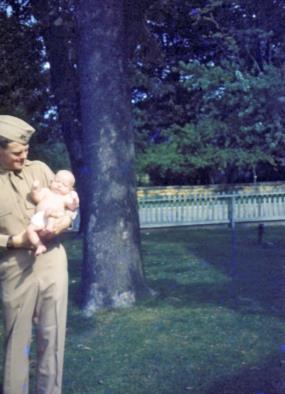
My father and me in 1944 before he left for Europe
My mother later wrote:
The then Capt Butt had received Army orders in December 1943 to go to Socorro where he would work in an Army officers training program at the School of Mines there. We made the long trip out slowly as I was about seven months pregnant. Upon arriving, we went to a little old hotel (the town’s only) at the end of the road, staying there for a few days looking for housing. We eventually moved into an adobe duplex which had originally been a one-family house, the home-place of a ranch complex. It was a dreary vista for any eyes and a difficult one for a pregnant, sickly female. Shopping was traumatic, with only naked, cold rabbit offered in the grocery meat counters, or fried, the only meat on the menu in the two town restaurants. Overly hot Mexican food was an alternative. There being no doctors or hospital in Socorro, our frequent weekends to Albuquerque to see the obstetrician offered a chance to enjoy the hospitality of the lovely Alvarado Hotel there. The Santa Fe charged right up to the doorway of the hotel where Indians in native garb waited to show and sell their arts to incoming tourists. Literally, it was a "Gateway to the West" as the sign over the entrance gate stated.
To return to our arrival in Socorro, and the little hotel there where we went on our arrival night, there was much scurrying about as a large party was to be held that evening. Since visitors at the hotel were few and Tom's position at the local college made him already known, we were invited to join in the festivities. The party was a birthday celebration to honor the grand dame of Socorro, the beloved Senora Baca. All the town seemed to be there to pay tribute to the tiny little lady of 90, beautifully dressed in an ankle length black silk of an earlier day, with lace and jewels to make a picture perfect image. She and her family were among the earliest, and surely the most distinguished, of the Socorro citizens and one of the few aristocratic Spanish families to still be social, political and economic leaders. Her late husband, El Fago Baca, had been their sheriff in territorial days, as well as U.S. Marshall and legislator.
The senora reigned that evening as a queen might, graciously greeting all well-wishers from her throne-like seat in the large hall. We were enchanted. It was nearly a year later, back in Batesville, that I learned from Aunt Dan that the same Senora Baca had been her dearest friend in those much earlier days when they were frontier wives together at Socorro, the senora of landed Spanish gentry and Aunt Dan, who followed the Santa Fe through the wilderness of New Mexico. Time and the world become swiftly small for us. The new orders for overseas duty had arrived the day after the baby’s arrival in a hospital in Albuquerque.
My father spent a short time in Ft. Worth at another high school ROTC program before shipping to Europe as a legal specialist in foreign claims. He disembarked at Omaha Beach in Normandy in September, 1944, about three months after D-Day, and then followed the front through France and Belgium where he commanded a small detachment (Claims Office, Team 6816) settling claims of Europeans against the American military.
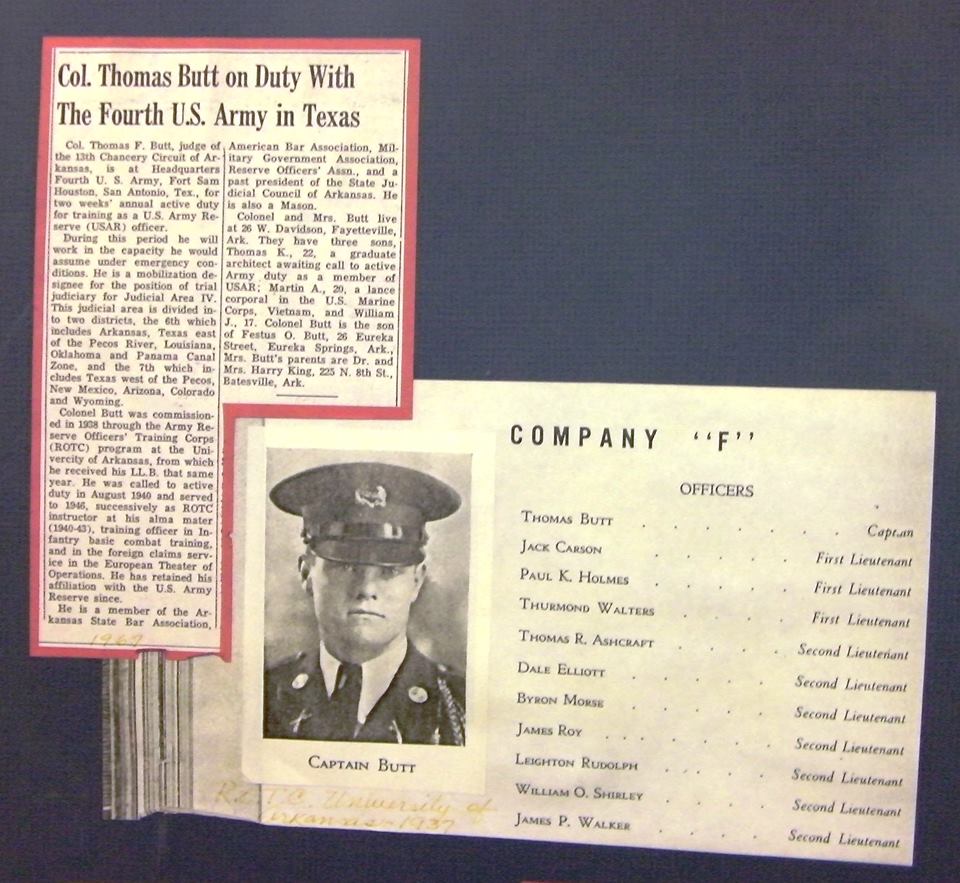
He moved from place to place through northwestern France and eventually into southern Belgium until the war ended in the spring of 1945.
More of Andrew’s 1991 interview:
I saw service in the United States, and in France, Belgium, Luxembourg, Holland, and Germany, (pause) Oh, and England. I went overseas in 1944 after the Normandy invasion. I arrived at a little bitty town on the west coast of Scotland, called Greenock spelled G - R - double E - N - O - C - K, and it was a port capable of handling large ocean - going vessels, and I went over on a former French luxury liner called, the Isle de France, and it had been put into war service and stripped of all its elegant interior and arranged for enough bunks and space to carry about four thousand or five thousand soldiers. Because I was a lawyer, the army had sent out word to various installations all over the United States saying that there was a need for lawyers and insurance agents and doctors and real estate claims adjusters to work with what were called foreign claims teams in the foreign claims service, and our job was to set up a place to work on the European continent and there received the complaints of the civilians who claimed that the American soldiers had stolen or damaged or ruined their property. They were making a claim against the United States to pay them the value of their lost, damaged, or stolen property, caused by the thievery of American soldiers or the wrongful damage of property. That entire operation was called the foreign claims service, and our job, as I say, was to receive the foreign citizens, to investigate them, and to determine if the claim was fair and to determine if the American soldiers had done the damage, and if so authorize payment, but equally to determine if the American soldiers didn't do it and if they were not negligent in doing so, than the claim was denied. There was an absolute rule that any damage caused by combat action, the United States would not pay for, because that was just a necessary result of warfare and of course the United States had treaties with all these countries, and it was agreed that the U.S. would not be obliged to pay for any damage caused by combat. But for example if a soldier got drunk on pass and broke windows or ran his jeep into the fence of a citizen, or whether he was drunk or not, if he was just a no good bum and he broke into a bakery shop and stole a bunch of bread or whatever, he was just a plain thief, and when that was established the United States would pay.
I found it extremely interesting to get to know something of the country of France and Belgium and Luxembourg and Holland simply by being in a foreign country that I'd never been in before, and getting to know a good many of the citizens of those different countries, England too of course. The foreign claims service and the unit I belonged to was not a combat army unit, we were not a fighting unit, but since we were on the continent and in the area of operations following immediately behind the area of combat we saw firsthand the results of fighting and battle damage and saw the results of the heavy bombardment by the English and American air forces, and of course we could see and hear the bombers flying over, day and night, and that was inspiring. Those are ours, those are our airmen up there; we're just whippin' the hell out of those Germans, (laughs).
I never did see any of the enemy in wartime, but I saw a good many German prisoners immediately after the war, and they, of course, had either surrendered or been otherwise captured and for a few months after the war in Europe was over, I was still there waiting to get sent home, and we were mainly just marking time waiting for our orders to be sent home. We had to have a place to live and to eat and keep alive, (laughs) like anybody does any time and for quite a while we, meaning a large number of American officers were assigned quarters in, oh I guess what you could call hotels and apartment buildings, that sort of thing, and German prisoners were there to cook and serve and make the beds and keep house for us.
When I arrived in September, of 1944, and you will remember that what we called and what history calls D-Day was June 6, 1944 and the actual fighting, the invasion was very, very heavy fighting, so, although I didn't actually land in France until about the first week in September, which would have been three months after the invasion, the fighting was still going on less than fifty miles away. So the first thing I saw were bombed out bridges and burned villages and chewed up ground, where the tank warfare had taken place, and just the general wreckage of heavy warfare. We landed on Omaha beach, where the invasion forces had, and the great big steel barriers that the Germans had put up were still in the water, and lots of barbed wire, and all the German pill boxes, heavy concrete bunkers were up on the ledge overlooking the coast with the knocked out German guns, they were all still there. There was very extensive battle damage of bombardment and artillery damage all through France and Holland. We were stationed in the Ardennes forest, where the heaviest tank fighting and infantry fighting during the so called Battle of the Bulge, took place. And we were stationed after the fighting of course, but there were just burned out tanks all over the place, and you could see where trees had been just mowed down by artillery fire and so on, so that was just quite a thing to see that, in the wake of battle, the damage that had occurred.
Vietnam - Martin Andrew Butt
My younger brother, by three years, Martin, enlisted in the Marines in 1966 and spent most of 1967 in Vietnam. For the full story, click here. Martin died in an automobile accident in 1968 at the age of 22.
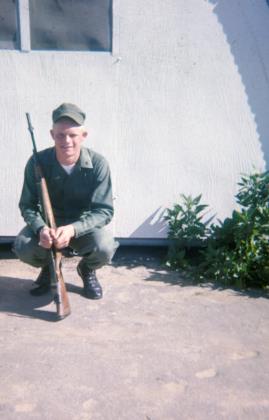
In early 1967, Martin Butt at Da Nang, Vietnam, assigned in a support role, including guard duty, in Marine Aircraft Group 11 (MAG-11) Group Supply.
Korea – William Jackson (Jack) Butt II
My youngest brother, Jack, attended the University of Virginia on a ROTC scholarship and was commissioned a second lieutenant upon graduation in 1972. He received his J.D. with Honors in 1975 and went on active duty with the Army, was promoted to captain, and served a year in Korea as a military lawyer with the Judge Advocate General’s Corps. While on active duty he completed his masters in tax law at George Washington University. Jack was honorably discharged to the reserves in 1979, where he ultimately was promoted to major..
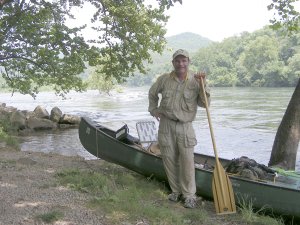
Jack Butt of Fayetteville stands along the White River at Buffalo City in June after hiking and paddling his way down all 132 floatable miles of the Buffalo River from Ponca to the White River. Butt embarked on the journey to celebrate his 60th birthday.
Jack joined the Davis Law Firm in Fayetteville, AR, in 1981 after four years’ practice with the Army Judge Advocate General’s Corps and two years’ private practice in Fairfax, Virginia. Jack regularly litigates in state and federal courts and before various administrative agencies. He was first qualified as an Arkansas Board Recognized Tax Specialist in 1986; has been rated AV-Preeminent by Martindale-Hubbell since 1994; was recognized by the Arkansas Times 1995 and 2000 polls as one of the top 10 business lawyers in Arkansas; and is listed in Best Lawyers in America in Trusts and Estates and in SuperLawyers in Commercial Litigation. Jack was President of the Washington County Bar Association in 1996-1997; served as President of the Northwest Arkansas Estate Planning Council from 2004-2006; and is an emeritus member of the William B. Putman Inns of Court, serving as President 2010-2011. He received the Arkansas Bar Association’s Outstanding Lawyer Citizen Award for 1999-2000. Jack is a member of the Washington County and Arkansas Bar Associations, and is admitted to practice before the United States Tax Court and the United States Supreme Court.
Elected to the Fayetteville School Board in 1985, he served until 1991. Afterward, he took up the creation of the Fayetteville Public Education Foundation in 1992 and served as its president for the next ten years. In 1997, Arkansas Times named him as one of five “Public School Heros” for his service to public education. In 2000, he initiated a pro bono challenge to a $6 million dollar attorneys’ fee in the Hickstax refund case that resulted in a reduction by over two million dollars in lawyers fees, to the benefit of the public schools and taxpayers. He has served on the boards of the Fayetteville Youth Center, Lifestyles Foundation ,Rotary, and Downtown Fayetteville Unlimited. Jack and Anne have three children: Mary Claire, Anna, and Jackson.
Vietnam – Thomas King (Tom) Butt
I was commissioned a second lieutenant in the Army Corps of Engineers in 1967 after completing four years of ROTC with a summer camp at Ft. Sill, OK, and graduating from the University of Arkansas with a Bachelor of Architecture degree. My MOS was 1331, Combat Engineer Unit Commander. Called to active duty in March of 1968, I attended the Army Engineer Basic Course in Ft. Belvoir, VA, and was assigned as Basic Combat Training Officer at Ft. Polk, LA. I was in charge of the daily training schedule and supervision of Company E, 4th Battalion, 2nd Training Brigade. Later in 1968, I was transferred to the Base Master Planning Team.
In March of 1969, I arrived in Vietnam and was assigned to the Operations Section of the 159th Engineer Group, headquartered at Long Binh. The Group consisted of 6,000 engineer troops in three battalions plus a float bridge company. It also supervised some 3,000 civilians working for road construction contractors. My job was monitoring, scheduling, documenting and trouble-shooting hundreds of projects (missions) in the Group’s Area of Operations, which included Saigon and an area 100 miles to the north and east and 50 miles to the south. The Group operated three quarry and asphalt plants and was engaged in land clearing and construction of roads, fire bases, bridges, protective structures and buildings.
I was discharged in Vietnam in February 1970 and began a trip around the world that took me back to the U.S. through southeast Asia, Russia and Europe. For the entire story, click here.
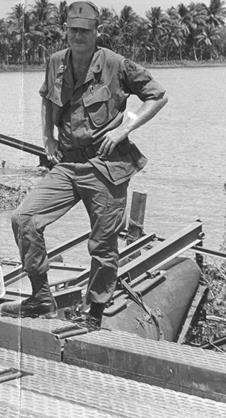
Tom Butt on the Phu Cuong float bridge erected by Army Engineers after the original bridge was blown up by the Viet Cong in November 1968.
|
|

